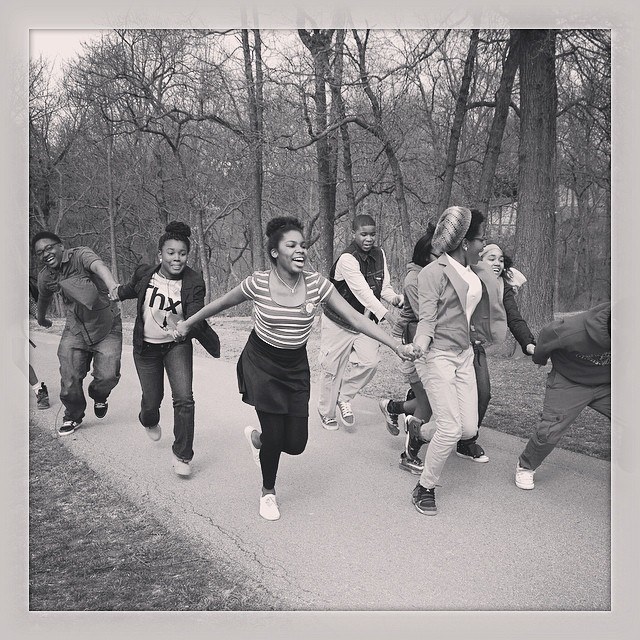What do we owe our animals? How can we say which relationship, animal or human, is more valuable? More necessary? As I led him to the car and watched his legs quiver a bit before he hopped in, there were tears in my eyes because I knew what I’d have to do.
***
My dog, Gonzo, is a true mutt. A Heinz 57. He’s a stocky desert scavenger with thick, red-brown fur, white paws, ears that flop over, and a tail that curls up. The day I rescued him from a parking lot adoption event in Arizona, he was a scrappy-looking thing, just 3 months old, panting in the sun. It was 2001 or 2002, I’m not sure. I do remember that he rested his chin on my knee the whole way home. I had adopted him with my then-husband, but when we split up there was no question about who would get the dog. Gonzo was mine.
My post-divorce period was rough, but I was glad I had a faithful friend by my side. When I threw a glass down on the floor just to hear it smash, then slid down along the kitchen cabinets, plopped my butt on the cold tile and began to cry, Gonzo pushed himself onto my lap and licked my face. We lived for a while near a rocky preserve in Phoenix, and every day we’d hike it, sometimes stopping warily when a coyote trotted by. I never feared to live in this semi-rough neighborhood called “Sunnyslope,” the only place I could then afford, because Gonzo’s heavy growl and sharp, sudden bark hid his gentle, mama’s-boy nature.
Time passed. When I put on a record and sang along, Gonzo was there, too. He’d leap with me as I danced, thinking it was a new form of play. At night, he’d settle down on my feet or stretch out along the length of one of my legs, leaning his entire body against me. We vacationed together, driving from Phoenix to Mexico, from Austin to St. Louis, and back again. On the Mexican beach, Gonzo’s herding nature would take over. He’d nip at my ankles when I went toward the water. When that failed, and I unadvisedly dove into the waves, he’d whimper at the shore. Then, desperate, he’d paddle after me and nudge me with his snout. My favorite picture of us is on one of those beaches: I’m leaning down to scratch his head, and he’s smiling up at me with a doggy tongue hanging out one side of his mouth. Over a decade together, Gonzo became my little furry son. We were like Velcro.
***
After moving back to the Midwest, settling down, dating again, I met another dog-lover named Chad. We felt comfortable together. We wanted the same things. And so we began talking about cohabitation as we gradually fell in love. There was just one problem: He had a rescue dog, too. A big, lovable problem child named Braunschweiger.
Brauni was – is – a brindle-black Rottweiler mix. An irrepressible, slobbery, 95-pound love beast. The kind of pup who’ll throw both paws over your shoulders when you walk in the door, and then run for a stick or a rope or anything that you’ll throw for him.
When I first met this pair of gruff loners, I couldn’t approach Chad when Brauni was in the room. The minute I tried to hug or kiss my boyfriend in front of him, he’d leap between us and bark. It took quite a while for Brauni to get comfortable with me sitting on the couch next to his human.
The whole experience reminded me of the time, after months and months of sleeping alone, I brought a man back to my place. Gonzo tolerated this … this other creature in my bed. But he chewed up one of my most expensive bras to express his disapproval. Clearly, I’d been through this before. I figured I’d have to give Brauni time to warm up to the idea of another person in the house. Not to mention another dog!
Unfortunately, unlike Gonzo, Brauni wasn’t socialized or trained as a puppy. Chad was away at work too often to fully fix the problem when Brauni was young, but it didn’t really matter then! Brauni had a home, and love, with a single human he clearly adored. Then I came into the picture.
So. Two loners like us, and two very protective dogs. What to do?
We took it slow. After consulting a dog trainer, we began walking the two dogs, side-by-side, several times a week. Brauni would leer at Gonzo with the unsettling expression of a playground creep on his face.
“Does that look mean he wants to play with Gonzo, or kill him?” I asked.
The dog trainer introduced us to a halter-like device for the more-aggressive Brauni and gave us instructions that sounded hopeful. We figured the dogs would either fight it out once and then become fast friends, or simply tolerate each other in their golden years.
As weeks of this uncertainty dragged on and we doggedly (pun intended) walked our two grumpy old mutts, I started to sort-of move in. I brought over books, pictures, a comforter, a few towels. We both became rather impatient. I was tired of driving 25 minutes (40 with traffic) whenever I wanted to visit my boyfriend. It felt silly to leave his house at night when his home felt so much like mine – my art on his walls, a few pieces we’d both picked out waiting to be hung up behind the sofa, a new shelf for our shared bedroom… We helped each other mow the lawn. We wandered through Ikea, bickering mildly and then holding hands, like a comfortable, middle-aged married couple. We had become one another’s family.
But our pets were family, too. And whenever I thought of my 15-year-old best friend, I worried for his well-being. We could not reconcile our happiness with the incompatibility of these two furry stepbrothers. After all, what do we owe our animals? How can we say which relationship, animal or human, is more valuable? More necessary?
The day we decided to “get the dogs together” – that is, let them loose in Chad’s fenced backyard and hope for the best – we prepared. We called the dog trainer, a friendly man with years of experience. We wore Chad’s dog out, walking him around the block several times and pacifying him with treats. Then we walked him again, side-by-side with Gonz, like we’d done for weeks. Finally, we nervously led the leashed pups through the gate.
The trainer watched as Brauni strained on his leash, panting, his eyes fixed on Gonzo, his legs taut. As Gonzo sidled away from Brauni again and again – glancing at me, ducking his head – the trainer frowned. Finally, the man shook his head.
“You guys. This just won’t work. I’m sorry.”
He explained to us that Gonzo, at 15 or so, was too feeble – and Brauni too aggressive – for them to “fight it out” and eventually get used to one another.
“It would be like a really muscular 45-year-old beating up on a 100-year-old man,” he said. “I just can’t in good conscience recommend it.”
Chad mumbled a few sentences about the possibility of our families caring for Gonzo, and I looked down at my old friend who was, at that moment, biting at some grass and trembling a little. I interrupted the men.
“Well, I’m gonna take Gonzo home. Chad, I’ll call you.” Then I led my dog away, closing the gate behind us. As I guided Gonzo to the car and watched his legs quiver a bit before he hopped in, there were tears in my eyes because I knew what I’d have to do.
***
Gonzo and I sleep late on Sundays. My little full-size bed is pushed against a big window in this turn-of-the-century flat, and we open the curtains and look down on our neighbors. Gonzo growls low at the cats and wags his tail when I say, “what a good guard dog.”
I get tired of living here sometimes, in a rented apartment, while my sweetheart lives in a house that he actually owns, so far away. I left half my belongings there! My lonely place, with its bare walls, resembles a student’s garret. But my loyal doggy friend is happy. So, I try not to feel impatient or resentful, even when I’m driving across town to visit Chad. To be honest, I’ve always felt like a student anyhow.
I took Gonzo to the vet the other day and she told me that he has arthritis in his spine. There will come a day, probably in the next year or two, when his back legs will simply give out. Already, one leg spasms at times, which startles Gonzo more than anything else. I give him anti-inflammatory treats, special food for his joints, and lots of meat because he loves meat and I love him.
Sometimes, I swear, Gonzo knows. He looks steadily at me, and then licks my face when I start to cry.
There’s no question. I’ll be his friend until he’s gone. And then, after, I’ll have time to make a home with the human whom I also love.


